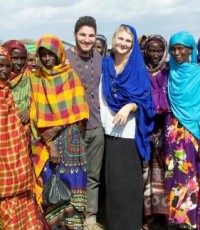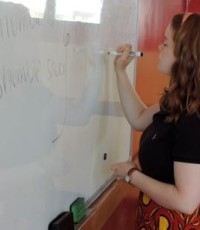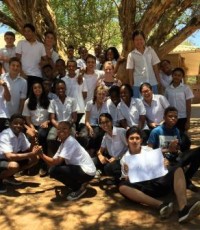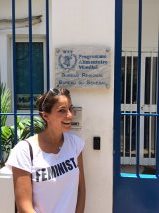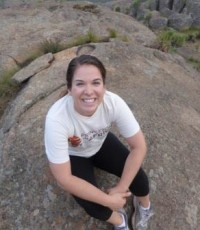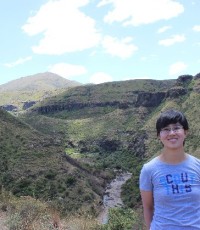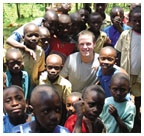November - December 2015
Dear Friends,
Happy holidays! We hope you enjoy reading this month’s Flyer about our Fellows’ impactful work and adventures across the African continent. This edition also contains photos from our annual gala (more event details and full photo gallery here!) and a Supporter Profile written by Addison Thompson, a PiAf 2002-03 Fellow and monthly donor to PiAf. In this season of giving, we offer a huge thanks to all those who support our work and continue to make our remarkable program possible.
Warm regards from Princeton,
Jodianna Ringel
Executive Director
PiAf Connections
Please click below to check out pictures of our Fellows, Alums and other members of the PiAf family meeting up at home and around Africa.
Notes from the Field
By Alex Domash, 2015-16 Fellow with The BOMA Project in Kenya
“Who is that guy in our trunk?” I whisper to Sabdio, one of our field officers. She turns her head to me with a mischievous smile and whispers back, “Even me… I don’t know!”
It’s day five in the field, and by this point I have learned to expect the unexpected. Dusk is falling rapidly, and our Toyota land cruiser is rustling through the arid Northern Kenya desert. We have two people sitting in the front passenger seat, five “sitting” in the back, and (apparently?) three in the trunk. Just maybe the drive would have been comfortable if we were driving on a road, but the bumpy, unmarked, rolling sand dunes hardly constitute as such.
Suddenly, the vehicle stops, and the mysterious man climbs out of the trunk. We leave him there, standing in the desert with nothing but sand extending for miles in every direction. I try to ask our driver what the heck just happened, but the raspy voice coming from the music playing on the stereo drowns my own voice out. I remind myself to embrace the ambiguity – a necessity when working in this type of setting.
After driving through the night for some time, we finally arrive at a small village called Galas. I step out of the car under the breathtaking starry night sky and enter a small home that belongs to one of our field mentors. After eating nothing but goat for the past five days, I secretly have my fingers crossed that our supper will consist of anything but. Boy, did I have another thing coming…
That night, not only did we have a dinner consisting of goat intestines and liver, but we were also welcomed into the home with a special gift. As a gesture of hospitality, the family had slaughtered a goat in anticipation of our arrival, and had used parts of the leg to make none other than freshly slaughtered goat bracelets for each and every one of us. The look on the faces of India (the other PiAf BOMA Fellow) and I told the whole story. Our induction into the world of goat was complete.
It’s a month later now, and I write this story with a large grin on my face. To me, these are the moments that make this fellowship year so unique: the opportunity to immerse myself in the unfamiliar, to seek comfort in the uncomfortable, and to experience the subtleties of another way of life. Going to the field has been one of my most cherished experiences so far, and has provided me with countless insights into the lives of the women we work for. And of course, it has also provided me with a killer goat bracelet to show off to my friends back home.
Notes from the Field
By Meghan Magee, 2015-16 Fellow with Indigenous Education Foundation of Tanzania in Tanzania
“To travel is to take a journey into yourself,” an anonymous wise traveler once penned. I have never been one for cheesy, inspirational travel quotes, believing they’re the stuff that make up regrettable tattoos and cringeworthy Instagram posts. However, after spending several months working at a secondary school in a Maasai community in the Monduli Hills of northern Tanzania, I’ve begun to rethink their value. During this time, I’ve discovered things about myself and developed talents I never knew I had. And with that, I give you a Buzzfeed-worthy listicle that reaffirms the cheesiest of travel quotes:
“5 Things I Learned About Myself As a PiAf Fellow”
- I can coach championship-winning basketball and softball teams.
The last time I stepped on a basketball court before this year was in 6th grade. However, with the regular basketball coach out with an injury, I found myself court-side, holding a clipboard, and trying to figure out what in the world “Zebra defense” meant. Several games and a few mishaps later, I was passionately cheering on my team and calling out plays like a pro. By the end of the season, both my softball and basketball teams took home gold trophies.
- I can direct a performance for 43 seventh-grade students who’ve only been speaking English for 3 months.
When approached with the daunting task of an end-of-the-year performance for the newest class at school, only one option came to mind: Frozen. A week later, an audience of hundreds of Orkeeswa students and parents enjoyed an interpretative song and dance to Frozen’s, “Let It Go.” This side of the Sahara has never seen such talented students pretending to be whirling snowflakes.
- I can lead a successful Zumba class to over fifty students.
My previous Zumba classes have been hosted in my living room to the unwilling audience of my sister and cat. Now, each week in dance club, I get to turn a classroom into a dance studio as dozens of eager students and I dance to songs from around the world.
- I can make friends (and jokes!) in Swahili.
I’ve always thought that the true test of language proficiency is the ability to make jokes. Before coming to Monduli, my Swahili had primarily been practiced with flash cards and textbooks. Now that I am surrounded by Swahili speakers, I get to practice language the way it should be practiced: with other people! I now have friends with whom I only communicate in Swahili. While my Swahili is still peppered with mistakes, I’m no longer too nervous to strike up a conversation or make an attempt at a bad joke.
- My life has turned into the stuff that cheesy travel quotes are made of.
Notes from the Field
By Meghan Murphy, 2015-16 Fellow with Maru-a-Pula in Botswana
Just a few weeks after graduation, I boarded a plane to Botswana to teach Junior Science at Maru-a-Pula, a private boarding school located in the capital, Gaborone. Now, five months later, Botswana is no longer this unfamiliar land-locked country in Southern Africa with a completely different culture and lifestyle. It has become a part of me. Just one example of this is how these Botswana-isms now constitute much of my everyday lingo:
Dumela mma, Dumela rra
In Botswana, every interaction you have starts with this greeting. It is absolutely necessary to greet every person you see, whether you cross their path directly or you see them from 15 meters away. This is a testament to Tswana culture, and their genuine desire to want to know you.
‘Now,’ ‘Just now’ and ‘now now’
I knew once I left the States that I would have to operate on “African time,” but I did not realize how complex this could be. In Southern Africa there are a few different time frames I have come to know and love. 1. “Now” – not to be confused with the conventional now; it actually means ‘maybe later (this week, month, or maybe never).’ 2. “Just now” – it is a bit more pressing but also falls in the category of non-immediate, perhaps later today. 3. The final iteration is the “Now now,” which means “as soon as possible.” Realizing that something may never get done ‘now,’ was a tough adjustment, especially for someone who operates on immediacy and deadlines; but it has also been the greatest blessing. Time is no longer something that dictates my day to day. In Botswana, time does not pass us by, it continues with us.
Yebo yes!
Yebo yes! is usually said from the deepest part of your stomach and at a volume comparable to a yell. This expression encompasses all of the enthusiasm that I have experienced since being in Bots. Whether it is my students excited about a science topic, friends eager to celebrate the American holiday of Thanksgiving, or even young kids from the village of Malwelwe happy to see our student service group, Batswana people are so gracious and enthusiastic no matter the occasion.
Eish!
This has come to be one of my most utilized phrases since being in Botswana. It is incredible to me that I have survived without it all my life. It can express any emotion ranging from surprise to frustration to happiness. It is commonly used when we experience yet another water shortage, temperatures exceed 45 degrees Celsius, or when my students have more energy than my 3 cups of coffee can handle. Whatever the feeling, it is universally understood and reciprocated here – and for that, I love it.
It has been quite a whirlwind few months in Botswana, and I have been grateful for every second. Botswana’s nuanced culture has quickly become part of my own character and vernacular. And the vast, dry Botswana plains have become my home.
Notes from the Field
By Violette Perrotte, 2015-16 Fellow with UN World Food Programme in Senegal
Graduating from college is tough. Starting your first job is tough. Moving to a different country is tough. Doing all three at once was, well, really tough. My first month as a Programme Assistant for the Regional Bureau of World Food Programme in Dakar consisted mostly of Skyping my family and complaining. It had been so easy for me, a French native, to move to Baltimore, out of all American cities, for college and then travel to Russia, South Africa and Ethiopia during my college career, that I did not understand why it was so hard to adapt to Dakar, a beautiful city by the sea, with so many things to do, places to see, and, honestly, the nicest people in all of Africa (sorry, not sorry, other Fellows).
It soon dawned on me that adapting to Dakar was not the real problem, but adapting to real life was what I was struggling with the most. Being a Princeton in Africa Fellow straight out of college is such an enriching experience, but it is really important to acknowledge that you are not only moving to a different continent with a different culture and language, but you are also getting your first job and interacting with people who have been in the workforce for 10, 20, maybe 40 years. And so, as you would in New York City or Paris, you have to adapt to a new lifestyle.
After a few months, I found a balance here that helped me transition into this new life more easily: Stay very connected to your family and friends, to continue being the person you have always been, but let other, new, different people in your life, to help you grow. Hang out with expats to feel “home,” but make sure to spend time and exchange with locals, to feel integrated into your new culture and enriched. Be foolish, be yourself, take some time alone, but most importantly accept that everything is changing, that nothing is the same anymore, and that there is beauty in that.
I am an employee. This thought was so strange to me for a long time and made me feel out of place. However, after six months, I finally feel comfortable in that role, and even more than that, I feel legitimate. I love the people at the World Food Programme: they are from so many different backgrounds, and so full of experiences and stories about all the countries they have lived in. I love Dakar, the kindness of its people, its beautiful beaches, sunsets and restaurants, the diversity of its expatriates, the open-mindedness of Senegalese men and women, and so much more. I now have my place in Dakar, as an expat, as a Programme Assistant, as a young graduate, and as a Princeton in Africa Fellow.
Notes from the Field
By Lauren Theis, 2015-16 Fellow with Clinton Health Access Initiative in Swaziland
Laying the Foundation for Capacity Building
A core component of Clinton Health Access Initiative’s (CHAI) work is to support governments in building capacity to deliver high-quality care and treatment programs, particularly for the high disease burden areas of HIV/AIDS, tuberculosis, and malaria. To achieve this end, CHAI’s country teams conduct work ranging from optimizing human resources for health to negotiating for lower drug and vaccine costs to accelerate access to life-saving treatments. As the 2015-2016 Princeton in Africa Fellow at CHAI Swaziland, I work as part of the Sustainable Health Financing team. The goal of CHAI’s health financing work is to help “remove financing as a barrier to achieving universal health coverage” through improved understanding of resource needs, management of existing resources, and security of long-term health funding (CHAI, 2015).
Throughout all their interventions, “CHAI works hand-in-hand with the highest level of government to ensure that all efforts are sustainable, aligned with the government’s priorities, and tailored to each country’s particular challenges” (CHAI, 2015). My experience thus far as a PiAf Fellow has pushed me to challenge my own definition of capacity building, a key facet of such interventions. Is capacity building facilitating conversation amongst cross-Ministry leadership members to cohesively identify financial inefficiencies within the current health system? Is it developing an Excel tool to digitally track the movement of a payment from the Ministry of Health through Treasury and Central Bank? Is it training an accountant how to utilize a tool in order to quickly identify the location of payments to follow-up on payment inertia?
Reflecting upon the past four months in my post, I’ve realized that the process of building capacity is similar to the construction of any structure intended to stand the test of time, and requires careful planning and appropriate materials; these materials include a clear blueprint of aligned priorities, proper construction tools, and physical ability to carry out the necessary work. Capacity building is following all of the above building instructions to help shift perspectives to approach challenges using a systems-approach to shape the overall structure of health financing, not just addressing the creation of each finance wall as a discrete feature.
The continuous learning and re-definition of capacity building is something I am excited to keep in the back of my mind throughout my career in global health. In addition to “service for a year, commitment for a lifetime,” Princeton in Africa Fellows should be committed to being the construction workers that advocate for developments that can weather future storms and changes in ownership. Fellows’ contributions should have the potential to last a lifetime longer than that of our presence in a given organization, country, or role. If our contributions do not continue beyond our presence, it cannot happen because we have tried to build capacity on poor foundation; we must continue to work with our counterparts to refine the blueprints, identify the optimal combination of materials available in our environment, and build our structures hand-in-hand.
Notes from the Field
By Cameron Yi, 2015-16 Fellow with Baylor International Pediatric AIDS Initiative in Lesotho
I walk warily down the steep steps leading from the small plane that has brought me to Maseru from Johannesburg. Finally on the ground after hours of flying, I look up for my first glimpse of Lesotho. Beyond the airfield, the land stretches on and on, the setting sun dyeing the yellow grass a hazy orange as the stalks sway in the chilly winter breeze. I am both a little terrified and awestruck. Terrified because where was the city of Maseru? Where were the houses, the cars, the roads? But at the same time, there was so much openness. I couldn’t remember the last time I had looked out and just seen land. I had graduated from college the week before, but this was the first moment that I really felt like I had graduated into the real world, away from the carefully cultivated structure of university life. Here, I was free to work with BIPAI, my fellowship organization, to sculpt the year as I wished.
In the four and a half months I have been here, I have primarily worked with BIPAI’s Teen Club, a psychosocial support group for HIV+ adolescents who come to the BIPAI clinic to receive healthcare free of charge. My work has included reaching out to partners such as Lesotho Red Cross Society to teach Teen Club members about First Aid; building a website to raise awareness; and presenting research on the impact of Teen Club to approximately 100 healthcare professionals at a BIPAI network meeting. While most of my days are spent in the second floor office above the BIPAI clinic, my favorite moments have taken place during my hours volunteering with Teen Club on the weekends.
A boy throws a Frisbee. It wobbles but manages to cut through the air.
“Good throw!” I say.
“Good throw!” There’s a giggle that runs through the semi-circle of tiny humans that surrounds me. During registration time at Teen Club, the kids are free to do what they please, and this particular group wants me to teach them how to play with the plastic circle I am holding.
I throw the disc back to him, and he sandwiches it between his hands.
“Nice catch,” I compliment him.
“Nice catch!” The children laugh as they clap their hands together alligator-style, mimicking the correct way to catch the spinning disc.
“Ayoba!” The kids turn at the shout and run towards a large circle that is forming.
“Ayoba nice!” They yell in answer to the question of how they are doing. In the circle, they listen closely to the agenda for the day: adherence to ARTs (Antioretroviral therapy).
Having found in my research that regularly attending Teen Club members tend to have better health outcomes, I feel fortunate to play a role in a program that strives to support the future and has such a beneficial impact on its participants. It is awe-inspiring how this clinic provides HIV and TB care free of charge to these adolescents, overcoming the challenges of a resource-limited setting to offer a complete package of services including Teen Club.
Notes from the Field
By Jasmin Yu, 2015-16 Fellow with UN World Food Programme in Malawi
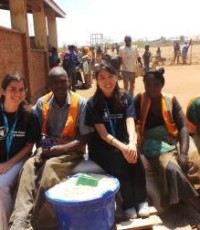
Jasmin (third from the left) and fellow WFP Malawi Fellow Erin Collins (far left) on a WFP trip to the Dzaleka refugee camp in Malawi.
Immediately upon exiting the WFP vehicle, we were welcomed by a large group of colorfully-clad female farmers dressed in chitenje and singing in unison as they danced a short gule, encircling our group of WFP staff. This was my first visit with donors to a Farmers’ Organization (FO) to view WFP’s Purchase for Progress (P4P) activities, which aims to link smallholder farmers with markets as well as provide trainings in financial management and business planning in order to ultimately increase farmer productivity and incomes.
The Mgwirizano FO, which is located in the rural Kumdulu Village about a 45-minute drive from the capital city of Lilongwe along bumpy, dusty dirt roads, was selected as the site for the field visit. Through support from WFP, Mgwirizano FO has successfully implemented key technologies such as fuel-efficient cook stoves, individual homestead woodlots and alternative conservation agriculture. The Chair of the FO greeted myself, WFP’s P4P Program Officer and Communications Officer as we prepared for representatives of the Flemish International Cooperation Agency (FICA), P4P’s largest donor, to arrive.
As part of the field visit, farmers demonstrated the grading process, displaying two piles of maize – one which had been manually sifted through to ensure that rocks and other materials were discarded, and the other with only high quality maize remaining. Female farmer members also gathered by the fuel-efficient stoves provided by P4P, explaining the reduction in time it now takes to gather firewood and cook meals – with each 100kg bundle taking approx. 5 hours to collect, just one headload now suffices to last more than two weeks. Additionally, the warehouse manager described storage procedures and explained the Warehouse Receipt System (WRS), which has enabled farmers to store and sell their commodities at a later time rather than immediately after harvest, when prices are usually lowest.
While my role within M&E was mostly to better understand P4P activities in order to establish a more streamlined M&E framework, discussing current data collection methods and reporting systems in place with the P4P Program Officer, meeting the farmers and discussing with them how the innovations have saved them time and labor was remarkable. The majority of FO members present were women, both young and old, whose livelihoods were enhanced through P4P technical assistance to the FOs.
Although much of WFP’s programming is centered around food assistance, including school feeding/supplementary feeding programs and food distributions to food insecure households as part of the annual lean season response, it is such longer-term development initiatives that truly draw me to working in the food security sector. In addition to programs such as P4P, climate-smart agriculture and other WFP resilience initiatives remain an area of interest that I hope to learn more about and pursue during the remainder of my time at WFP in the Warm Heart of Africa.
Notes from the Field
Supporter Profile: Addison Thompson, PiAf 2002-03 Fellow with International Rescue Committee in Rwanda
Addison Thompson (PiAf 2002-03 Fellow with International Rescue Committee in Rwanda) lives in Washington, DC and is an attorney at the law firm of Covington & Burling LLP. As a Fellow, he worked on improving women’s access to the justice system, establishing programs for street children, and other issues. After his fellowship, Addison worked for the IRC in Sudan on the response to the humanitarian crisis in Darfur before returning to the States for law school in 2004. Prior to joining his law firm, Addison was a prosecutor for four years with the U.S. Department of Justice, where he spent part of his time pursuing violators of human rights crimes. Addison supports PiAf as a monthly donor because the fellowship offers young professionals unmatched opportunities to work with, and learn from, the inspiring people and organizations spearheading Africa’s health, social, and economic development.






